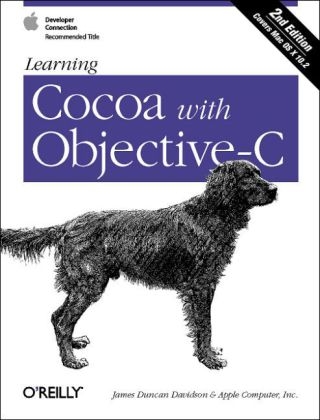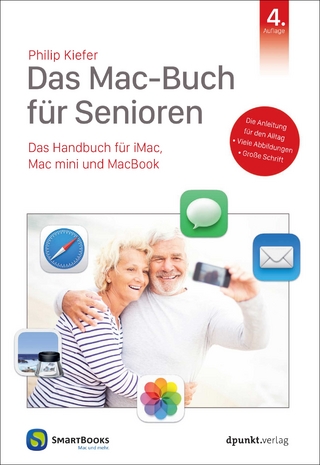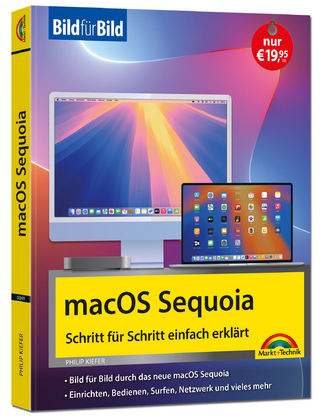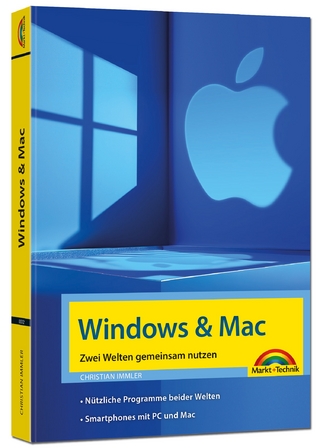
Learning Cocoa with Objective-C
O'Reilly Media (Verlag)
978-0-596-00301-2 (ISBN)
- Titel ist leider vergriffen;
keine Neuauflage - Artikel merken
Learning Cocoa with Objective-C is the "must-have" book for people who want to develop applications for Mac OS X, and is the only book approved and reviewed by Apple engineers. Based on the Jaguar release of Mac OS X 10.2, this edition of Learning Cocoa includes examples that use the Address Book and Universal Access APIs. Also included is a handy quick reference card, charting Cocoa's Foundation and AppKit frameworks, along with an Appendix that includes a listing of resources essential to any Cocoa developer--beginning or advanced. Completely revised and updated, this 2nd edition begins with some simple examples to familiarize you with the basic elements of Cocoa programming as well Apple's Developer Tools, including Project Builder and Interface Builder. After introducing you to Project Builder and Interface Builder, it brings you quickly up to speed on the concepts of object-oriented programming with Objective-C, the language of choice for building Cocoa applications. From there, each chapter presents a different sample program for you to build, with easy to follow, step-by-step instructions to teach you the fundamentals of Cocoa programming.
The techniques you will learn in each chapter lay the foundation for more advanced techniques and concepts presented in later chapters. You'll learn how to: * Effectively use Apple's suite of Developer Tools, including Project Builder and Interface Builder * Build single- and multiple-window document-based applications * Manipulate text data using Cocoa's text handling capabilities * Draw with Cocoa * Add scripting functionality to your applications * Localize your application for multiple language support * Polish off your application by adding an icon for use in the Dock, provide Help, and package your program for distribution Each chapter ends with a series of Examples, challenging you to test your newly-learned skills by tweaking the application you've just built, or to go back to an earlier example and add to it some new functionality. Solutions are provided in the Appendix, but you're encouraged to learn by trying. Extensive programming experience is not required to complete the examples in the book, though experience with the C programming language will be helpful.
If you are familiar with an object-oriented programming language such as Java or Smalltalk, you will rapidly come up to speed with the Objective-C language. Otherwise, basic object-oriented and language concepts are covered where needed.
James Duncan Davidson is a freelance author, speaker, and software consultant focusing on Mac OS X, Java and XML technologies. He regularly presents at conferences all over the world on topics ranging from Open Source to programming Java effectively. He was the original author of Apache Tomcat and Apache Ant and was instrumental in their donation to the Apache Software Foundation by Sun Microsystems. While working at Sun, he authored two versions of the Java Servlet API specification as well as the Java API for XML Processing specification. He currently resides in San Francisco, California and can be found on the net at www.x180.net. Learning Carbon was created by the technical writers, engineers, support specialists, and other professionals at Apple Computer, Inc., who are committed to making Mac OS X a superior platform for innovation, productivity, and enjoyment. These professionals have diligently collected, compiled, and edited the information in this books to ensure that it is a useful resource for Mac OS X developers.
Preface Part I. Cocoa Overview and Foundation 1. Introduction to Cocoa The Mac OS X Programming Environment Cocoa Defined The Cocoa Frameworks Languages The Foundation Framework The Application Kit Framework 2. Cocoa Development Tools Installing the Developer Tools Interface Builder Other Tools Exercises 3. Object-Oriented Programming with Objective-C Introducing Objects Creating and Using Objects Methods and Messages Objective-C-Defined Types Creating New Classes Overriding Methods Other Concepts Exercises 4. The Cocoa Foundation Kit Strings Collections Memory Management Exercises Part II. Single-Window Applications 5. Graphical User Interfaces Graphical User Interfaces in Cocoa Designing Applications Using MVC Create the Currency Converter Project Create the Interface Define the Classes Connect the Model, Controller, and View Implement the Classes Build and Run Exercises 6. Windows, Views, and Controls Windows and the Window System The View Hierarchy Coordinate Systems Controls, Cells, and Formatters Targets and Actions Exercises 7. Custom Views Custom View Creation Steps Create a Custom View Drawing into a View: Behind the Scenes Draw Strings into a View Draw Paths into a View Exercises 8. Event Handling Events Dot View Application Event Delegation Notifications Exercises 9. Models and Data Functionality Protocols Key-Value Coding Table Views Table View Example Saving Data: Coding and Archiving Using Formatters Sorting Tables Exercises Part III. Document-Based Applications 10. Multiple Document Architecture Architectural Overview Building a Document-Based Application Exercises 11. Rich-Text Handling Cocoa's Text System Creating a Rich-Text Editor Enabling the Font Menu Text Storage and Attributed Text Enabling the Text Menu Handling Embedded Images Exercises Part IV. Miscellaneous Topics 12. Printing Printing a View Using Print Operations Setting Margins Exercises 13. Bundles and Resources Peeking Inside Bundles Using Bundles Exercises 14. Localization Mac OS X Language Preferences Localizing Resources Localizing Nib Files Localizing Strings Exercises 15. Defaults and Preferences How Preferences Work Using Defaults Command-Line Preferences Access Using Unique Application Identifiers Exercises 16. Accessory Windows The Role of File's Owner Making an Info Window Exercises 17. Finishing Touches Tidying Up the User Interface Providing an Icon Providing Help Customizing the About Box Tweaking Compiler Settings Packaging for Distribution Closure Exercises Part V. Appendixes A. Exercise Solutions B. Additional Resources C. Using the Foundation and Application Kit API References Index
| Erscheint lt. Verlag | 29.10.2002 |
|---|---|
| Zusatzinfo | 1, black & white illustrations |
| Verlagsort | Sebastopol |
| Sprache | englisch |
| Maße | 178 x 233 mm |
| Gewicht | 611 g |
| Einbandart | Paperback |
| Themenwelt | Informatik ► Betriebssysteme / Server ► Macintosh / Mac OS X |
| Mathematik / Informatik ► Informatik ► Programmiersprachen / -werkzeuge | |
| ISBN-10 | 0-596-00301-3 / 0596003013 |
| ISBN-13 | 978-0-596-00301-2 / 9780596003012 |
| Zustand | Neuware |
| Informationen gemäß Produktsicherheitsverordnung (GPSR) | |
| Haben Sie eine Frage zum Produkt? |
aus dem Bereich


